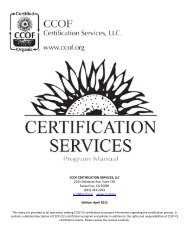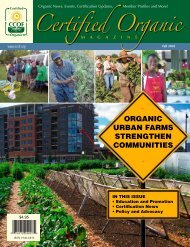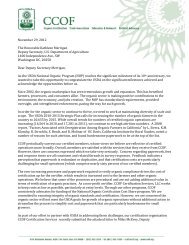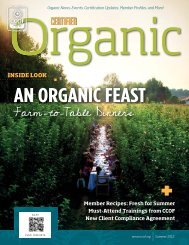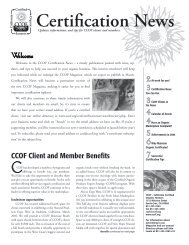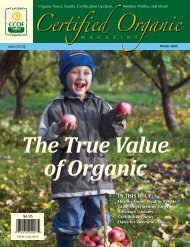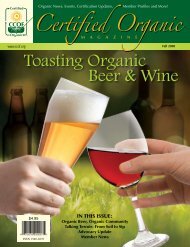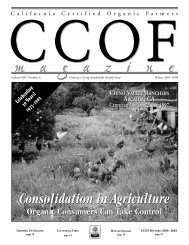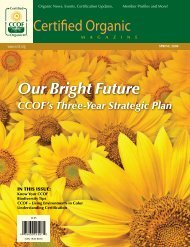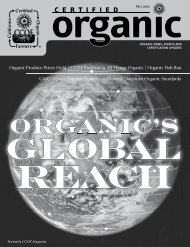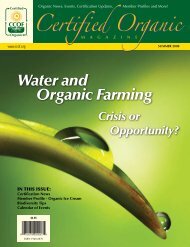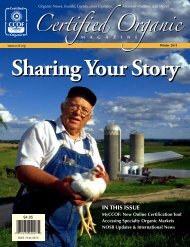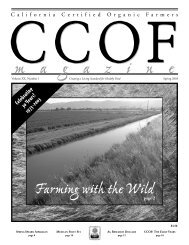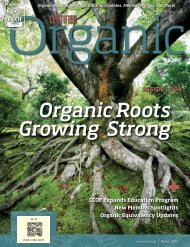Organic Gives Back - CCOF
Organic Gives Back - CCOF
Organic Gives Back - CCOF
- No tags were found...
Create successful ePaper yourself
Turn your PDF publications into a flip-book with our unique Google optimized e-Paper software.
Certification NewsCDFA State <strong>Organic</strong> ProgramProhibits Two CompostProductsOn August 5, 2009 the CaliforniaDepartment of Food and Agriculture(CDFA) State <strong>Organic</strong> Program (SOP)sent a notice to all registered organicgrowers and certifiers informing themthat Nortech Gold Compost couldnot be used in organic production.A similar notice was distributedon September 23, 2009 regardingGrover Wonder Grow Compost. Thenotices state that continued use ofthese materials in organic productioncould jeopardize an operation’sorganic status. This action is largelyunprecedented and may be an indicationof future enforcement actions.New Products and Labels:Seek Approval Prior toProduction and/or PrintingDuring recent National <strong>Organic</strong>Program (NOP) certifier trainings, theNOP indicated that there is limitedtolerance for the use of non-compliantlabels in the marketplace. <strong>CCOF</strong>operations that produce products ornew labels that do not meet eitherformulation or labeling requirementsare increasingly likely to receivenotices of non-compliance, and maynot be allowed to use up existinglabels that do not meet NOP standards.Please note that certifiers arerequired to submit copies of noticesof non-compliance to the USDA.Please submit labels and productsto <strong>CCOF</strong> prior to production to avoidcostly errors. <strong>CCOF</strong> will review yourlabel and/or product as quickly aspossible. If you have a compressedtimeline, please inform <strong>CCOF</strong> ofyour deadline so we can try to meetit. New products or labels that aredisclosed during inspections andfound to be out of compliance maybe considered significant issues. TheNOP has indicated a clear preferencethat certified operations use up labelswith minor mistakes within 90 days.Minor mistakes are categorized by USDAto include:• Incorrect formatting or locationof “Certified organic by <strong>CCOF</strong>”statement.Common serious mistakes on labels include:• Failure to include the statement“Certified organic by <strong>CCOF</strong>”below information identifyingthe handler or distributor.• Use of “100% <strong>Organic</strong>” onlabels when the product doesnot meet the specific requirementsfor this labeling category.• Failure to correctly identifyorganic ingredients in the ingredientpanel or unintentionallyrepresenting non-organicingredients as organic.• Use of the USDA seal in colorsother than the allowed combinations:green and brown orblack on a white or transparentbackground. Indistinguishablevariances such as dark navyblue instead of black may bepermissible, particularly onlabels printed in only one color.• Identification of a product with70-95% organic content as“<strong>Organic</strong>” when it should be labeled“Made with organic (specifiedingredient or food group).”• Use of “<strong>Organic</strong>” on labelsfor products that includenon-approved ingredientsor processing aids.To view the NOP’s presentationon labeling, go to www.ccof.org and click on “Certification,”then “Updates and Resources.”International StandardsUpdates:Korean <strong>Organic</strong> StandardsDeadline LoomsAs reported in past issues, the Korean<strong>Organic</strong> Standards are scheduledto be implemented on January 1,2010. As of this writing, the Koreangovernment has been firm that afterthis date products sold as organic inKorea must be produced and certifiedto Korean standards and certified bythe Ministry for Food, Agriculture,Forestry and Fisheries (MIFAFF) accreditedcertifier. The accreditationand certification requirements areproblematic for US certifiers, and itappears unlikely that all ingredients canbe re-certified to this new standard.<strong>CCOF</strong>, along with many other US organiccertifiers, several US Senators, the<strong>Organic</strong> Trade Association, a variety oftraders, the Foreign Agricultural Serviceand the National <strong>Organic</strong> Program havebeen working with Korean trade representativesto address this issue. Koreais seeking equivalency with Australia,and US officials are pursuing a similararrangement for US organic goods.It remains to be seen what will happenwhen the new standard goes intoeffect; however, Korean officials haveindicated that any product in Koreaor shipped prior to January 1, 2010will be allowed to be sold as organicuntil the product’s expiration date.<strong>CCOF</strong> is exploring options to workwith foreign certifiers to provide Korean<strong>Organic</strong> Standards certification in theUS for <strong>CCOF</strong> clients. This is not a preferableoption and may only be viablefor those companies with relatively fewsuppliers who are all <strong>CCOF</strong>-certifiedor certified to Korean standards independently.As new standards developworldwide we sincerely hope to seemore equivalency agreements, suchas the recent agreement between theUS and Canada. If you have specificconcerns, work with the Korean market,or have additional questions,please contact export@ccof.org formore information. <strong>CCOF</strong> depends onfeedback from clients to effectivelyadvocate for and meet your needs.22 <strong>CCOF</strong> Certified <strong>Organic</strong> Magazine—Fall 2009



